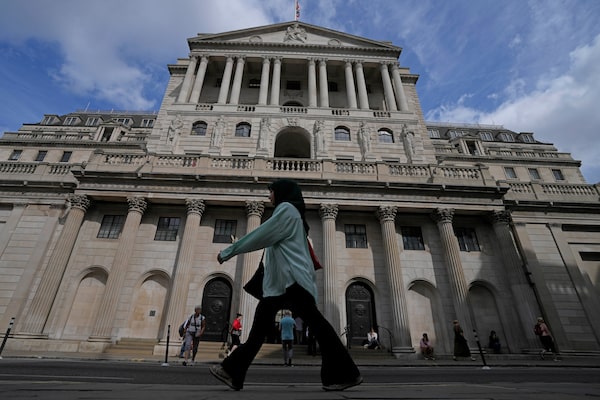As Britain mourns the passing of the Queen, the country also faces its most serious economic crisis in decades and markets will ponder the implications of the new government’s record-breaking energy package.
Leaders across Europe are scrambling to keep the lights on and U.S. inflation data should provide the last piece in the puzzle ahead of the Federal Reserve’s September meeting.
China meanwhile is trying to get banks to help spur the economy and Volkswagen seems set to embark on listing luxury car maker Porsche against a volatile markets backdrop.
Here is a look at the week ahead in markets:
BRITAIN IN CRISIS

People walk past the Bank of England in London, Thursday, Aug. 4.Frank Augstein/The Associated Press
Policy makers and investors are gauging the implications for inflation from the government’s huge energy bill bailout for households. The measures will bring down price pressures in the short term but could stoke them further ahead as consumers are spared the worst of the hit to their finances.
The Bank of England has just postponed its meeting, originally scheduled for Sept. 15 to Sept. 22 following the death of Queen Elizabeth. Many economists think it will raise interest rates by a further 50 basis points – normally a huge increase but less than the 75 basis-point rate hike that investors had been betting on increasingly until a few days ago.
Policy makers will have a few more data points that are scheduled for release to chew over before then, including economic output figures for July on Monday, the latest job market readings on Tuesday and August inflation on Wednesday.
RUNNING OUT OF GAS

Wagons wait beside oil tanks in Wesseling, near Cologne, Germany, on April 6, 2022.Martin Meissner/The Associated Press
Faced with soaring energy prices that threaten to spark social unrest, necessitate rationing and inflict a recession, Europe’s leaders are scrambling to pull together radical plans to counter Russian President Vladimir Putin’s gas cutoff.
Governments are spending hundreds of billions of euros to help consumers and businesses cope with runaway bills. A plan from Britain’s new government could cost as much as 150 billion pounds ($226.38-million), sending its currency to near-four decade lows.
Euro zone energy ministers gather on Friday in Brussels to set plans in motion and discuss options – including gas price caps and emergency credit lines for energy market participants, though there are no pain-free solutions in sight.
Meanwhile, more oil-importing countries – for example India – are considering joining the Group of Seven wealthy nations’ plan to cap the price of Russian oil, Washington said.
PRICING POWER
A shopper walks down an aisle in a newly opened Walmart Neighborhood Market in Chicago in this Sept. 21, 2011 file photo.Jim Young/Reuters
Tuesday’s U.S. inflation data is one of the last – and perhaps the most important – pieces of data that will help the Fed decide how aggressively it needs to hike rates in September.
July’s Consumer Price Index (CPI) report showed a surprising moderation in prices that helped spur a rebound in stocks. That rally has since faded with Fed chair Jerome Powell warning that the Fed’s single-minded fight to tame inflation could lead to economic pain.
On an annual basis, CPI increased by a weaker-than-expected 8.5 per cent in July, with the inflation gauge coming in flat, month-over-month. Early estimates for August call for a 0.1-per-cent decline on a monthly basis, but wildcards such as volatile energy prices are keeping investors on edge.
PUSHING ON A STRING?
Headquarters of the People's Bank of China (PBOC), the central bank, is pictured in Beijing, China Sept. 28, 2018.JASON LEE/Reuters
A downside surprise on Chinese inflation data on Friday cheered markets because it seems to afford policy makers plenty of room to ease and help boost a flagging economy.
But loan figures out shortly afterward pointed to the dilemma: Who wants to borrow in a downturn? Loan growth is scarcely budging, and a meagre rise in August was below analysts’ hopes.
The central bank has already flooded the system with cash, without improving confidence, since there is no clear path out of a deepening property crisis or COVID-19 lockdowns.
More help has been promised, but is yet to meaningfully arrive, leaving the Hang Seng Index lingering near major lows and the yuan close to a two-year trough.
Data on industrial production, house prices and retail sales due on Sept. 16 will give more indications on the state of the world’s second largest economy.
BOLD DEBUT
Employees of German car manufacturer Porsche install the windshield of a Porsche 911 at the Porsche factory in Stuttgart-Zuffenhausen, Germany, Feb. 19, 2019.RALPH ORLOWSKI/Reuters
It’s been a bleak year for capital markets. But that might not detract Volkswagen from listing luxury car maker Porsche.
Volkswagen fired the IPO starting gun even as European stock markets reeled from record inflation and the Russia energy standoff. The next three weeks will be crucial as bankers gather investor feedback and begin book building.
At the high end of estimates – investors expect a valuation between 60-85 billion euros ($78.4-$111.1-billion) – the IPO could be the largest in German history and the biggest in Europe since 1999, Refinitiv data showed.
Porsche will only backtrack on its stock-market debut if “severe geopolitical problems arise,” the sportscar brand’s chief financial officer said on Tuesday. The Frankfurt Stock Exchange has only seen two special purpose acquisition companies (SPACs) and one small primary listing in 2022.
Be smart with your money. Get the latest investing insights delivered right to your inbox three times a week, with the Globe Investor newsletter. Sign up today.